|
Tamils - a Nation without a State

Mauritius -
மொரிஷியஸ்
- an estimated 100,000 Tamils live in Mauritius -
Mauritius Protests against Genocide of
Tamils in Sri Lanka
TamilNet, Friday, 21 November 2008
Comment by
tamilnation.org
The protest march by hundreds of Mauritian Tamils to the Indian High
Commission in Mauritius, demanding that the Indian government prevail upon
Sri Lanka to stop the genocide of Tamils in the island is a welcome
demonstration of the growing togetherness of 70 million Tamils living today
in many lands - a togetherness that will continue to grow in the years to
come - and that particular river is not about to flow backwards. Said
that, Tamils everywhere will be concerned to ensure that protests
such as these
do not simply serve to secure New Delhi's own strategic interests in the
Indian Ocean region at the cost of justice and independence for the people
of Tamil Eelam. New Delhi's strategic interests were explicitly stated by
Indian
Foreign Minister Pranab Mukherjee with disarming frankness on 23 October
2008. -
�We have a very comprehensive relationship with Sri
Lanka. In our anxiety to protect the civilians, we should not forget
the strategic importance of this island to India's interests,...
especially in view of attempts by countries like Pakistan and China to
gain a strategic foothold in the island nation...Colombo had been told
that India would 'look after your security requirements, provided you do
not look around.'. We cannot have a playground of international players
in our backyard."
It is more than self evident to the Tamil people that New
Delhi's foreign policy is driven by its concern to secure that Colombo does
'not look around' and convert India's 'backyard' into a 'playground for
international actors.'. After all, the Tamil people have seen it all
before. In the early 1980's New Delhi armed and trained Tamil
militants so that it may pressure Sri Lanka to move away from extra
regional powers in the Indian Ocean region.
"...Tamil militancy received (India's) support
...as a response to (Sri Lanka's).. concrete and expanded military and
intelligence cooperation with the United States, Israel and Pakistan.
...The assessment was that these presences would pose a strategic threat
to India and they would encourage fissiparous movements in the southern
states of India. .. a process which could have found encouragement from
Pakistan and the US, given India's experience regarding their policies
in relation to Kashmir and the Punjab...." Paper
by J.N. Dixit on Indian Involvement in Sri Lanka and the Indo Sri Lanka
Agreement: A Retrospective Evaluation in Negotiating Peace in Sri Lanka,
International Alert Publication, February 1998
And in 1987, the
Indo Sri Lanka Accord secured New Delhi's strategic interests in the
Indian Ocean region. The
Exchange of Letters that preceded the signing of the Agreement declared
that "Trincomalee or any other ports in Sri Lanka will not be made available
for military use by any country in a manner prejudicial to India's
interests" and that the " work of restoring and operating the Trincomalee
Oil Tank will be undertaken as a joint operation between India and Sri
Lanka.".
And once New Delhi's strategic interests were secured,
the people of Tamil Eelam were left with
the comic opera 'reforms' of the 13th Amendment with Provincial Councils.
 "It
is difficult to discuss the provisions of the 13th Amendment to the Sri
Lanka Constitution seriously - they are so impossibly burlesque and
farcical... Under the 13th Amendment power will continue to reside in a
Sinhala dominated Central government, within the frame of an unitary
constitution. It has created Provincial Ministers who will
not exercise executive power but who will have executive
power exercised 'through' them! At the same time it has created a
Provincial Governor appointed by the Sri Lanka President (and holding
office at his pleasure) who will exercise executive power in respect of
provincial matters - a Provincial Governor who is also the
administrative head of the provincial public service and who has control
of the Provincial Finance Fund. And the 13th Amendment has created a
Provincial Council without control of planning, without control of the
provincial budget, without control of police and public order within the
province, without control of disposition of state land within the
province, without control of higher education and whose remaining meagre
legislative powers are subject to the over riding will of the Central
Parliament. Finally, the provisions of the Provincial Councils Act
itself may be amended from time to time by a simple majority of members
present and voting in Parliament."
13th Amendment to Sri Lanka Constitution - Devolution or Comic Opera?,
1988 "It
is difficult to discuss the provisions of the 13th Amendment to the Sri
Lanka Constitution seriously - they are so impossibly burlesque and
farcical... Under the 13th Amendment power will continue to reside in a
Sinhala dominated Central government, within the frame of an unitary
constitution. It has created Provincial Ministers who will
not exercise executive power but who will have executive
power exercised 'through' them! At the same time it has created a
Provincial Governor appointed by the Sri Lanka President (and holding
office at his pleasure) who will exercise executive power in respect of
provincial matters - a Provincial Governor who is also the
administrative head of the provincial public service and who has control
of the Provincial Finance Fund. And the 13th Amendment has created a
Provincial Council without control of planning, without control of the
provincial budget, without control of police and public order within the
province, without control of disposition of state land within the
province, without control of higher education and whose remaining meagre
legislative powers are subject to the over riding will of the Central
Parliament. Finally, the provisions of the Provincial Councils Act
itself may be amended from time to time by a simple majority of members
present and voting in Parliament."
13th Amendment to Sri Lanka Constitution - Devolution or Comic Opera?,
1988
Today, New Delhi is once again
touting the 13th Amendment and the Indo Sri Lanka Accord as the panacea
for the genocidal oppression suffered by the people of Tamil Eelam.
Tamils everywhere will continue to remind themselves of the old adage:
once bitten, twice shy. It is not that New Delhi cannot stop the killing of
Tamils in the island of Sri Lanka. It can. But it will not do so until two
conditions are satisfied -
one - Sri Lanka is weakened to the extent that
Sri Lanka stops 'looking around' and falls within the orbit
of New Delhi's influence in the Indian Ocean region and
two - the Tamils are so weakened that they are
compelled to accept comic opera reforms such as the
1988 13th Amendment.
New Delhi knows only too well (and is content to accept)
that Sinhala ethno nationalism will always prevent a genuine federal
solution to the conflict in the island - a genuine federal solution where
two independent and free peoples may associate with one another in equality
and in freedom.
"'India loves to play all sides,
and
has always done that,' said Reva Bhalla, an analyst with the U.S.
private intelligence firm Stratfor. 'They can cater to the
Tamil politicians
and benefit from the Tigers' military capability going down
without taking too much political risk.' Underscoring India's
dual-track approach to Sri Lanka, furious denials erupted from Colombo
and New Delhi last month after two Indian radar technicians were injured
in a Tiger assault on a Sri Lankan military base. Rajapaksa later said
the men were providing after-sales service to radars India's Bharat
Electronics sold to the military. India has also helped Sri Lanka
intercept Tiger boats, which it considers a threat to national
security..."
C. Bryson Hull in India Rumbles
over Sri Lanka war,
but to what end?,
17 October 2008,
Leaders of both the ruling party as well as the opposition of
Mauritius, including the Deputy Prime Minister, Mr. Rama Sithenen and the Leader
of the Opposition Mr. Paul Berenger attended an agitation against the genocide
of Tamils in the island of Sri Lanka on Thursday, 20 November 2008. The focal
event of the protest was the march of hundreds of Mauritian Tamils to the Indian
High Commission in Mauritius, demanding the Indian government to prevail upon
Sri Lanka to effect immediate ceasefire in the island and to commence talks with
the LTTE. The agitators also presented a memorandum on their demands to the
Foreign Minister of Mauritius and conducted a prayer at the Maariyamman Temple.
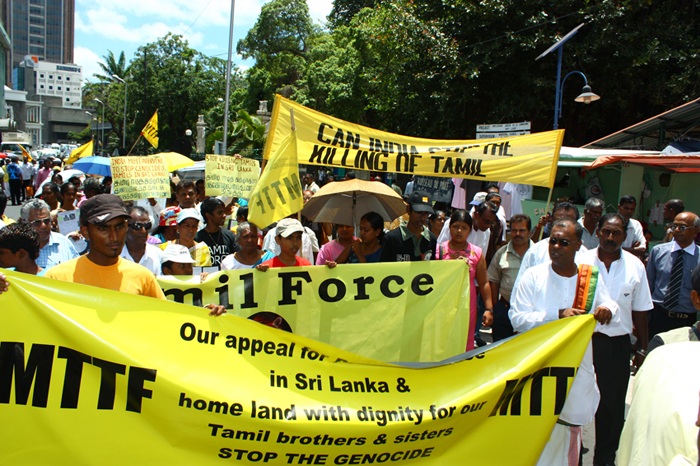
March of the protesters to the Indian High Commission
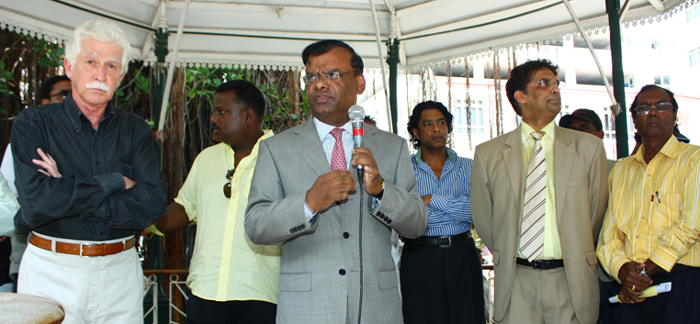
Deputy Prime Minister of Mauritius, Mr. Rama
Sithanen, speaking at the agitation.
Standing on his right is the leader of the opposition Mr. Paul Berenger.
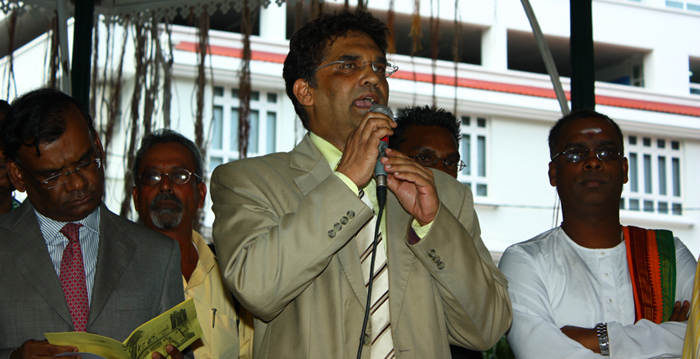
The speech of the Attorney General and Minister for
Human Rights Mr. Jaya Rama Valayden.
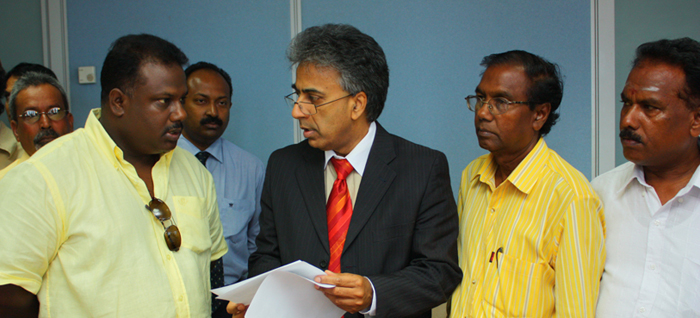
The MTTF Presdient Mr. Veeren Comaren [left] with the
Foreign Minister of Mauritius.
The Attorney General and Minister for Human Rights of Mauritius, Mr. Jaya
Rama Valayden in his speech condemned the Rajapaksa brothers for the genocide
committed on Tamils. Mauritius will not stop merely at protesting, he said.
The protest was organized by the Mauritius Tamil Temples Federation (MTTF), an
organization running about 150 koyils (temples) in Mauritius, the Tamil Force an
organization of youth for justice and fairness towards Tamils in Mauritius, the
Hindu Maha Jana Sangham, the Tamil Union, and the Tamil Eelam Support Committee
under the leadership of Ganess Permal. The MTTF president Mr. Veeran Comaren
explained to the Foreign Minister of the need of Mauritius government convincing
India to take necessary action. Former Foreign Minister Mr. Jayan Cuttaree,
former leader of the opposition and General Secretary of the MSM party, former
Foreign Secretary, Mr. Vijay Makhan and Tamil social activist, Thiruthondar
Cheetaen were among the notables who condemned the plight thrust upon the Eezham
Tamils. While the MSM party was in power in 1985, its leader and the then
Prime Minister spoke in support of Eezham Tamils at the United Nations.
Today�s opposition leader and the party chief of MMM, Mr Paul Berenger has
always been supportive to the cause of Eezham Tamils. Aya Agileshwaren, a
native of Jaffna, conducted the prayer at the Maariyamman Temple. Mauritius,
an island nation in the Indian Ocean off the coast of Africa, has predominantly
been populated by people of Indian origin during colonial times. Tamils and
people of European, African and Chinese origins are among the minorities.
Mauritius ranks first among all countries in Foreign Direct Investment (FDI)
inflows to India amounting to a total of nearly 11 billion U.S. dollars.
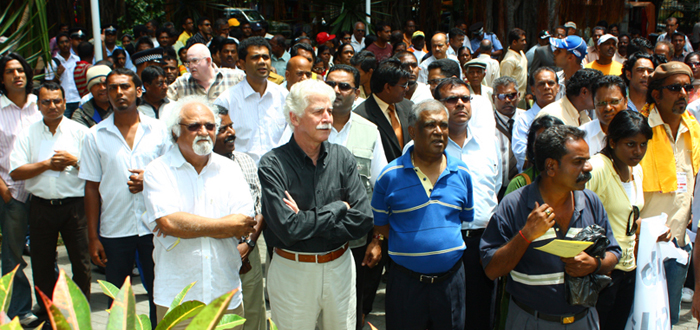
Former Foreign Minister Mr. Jayen Cuttaree (blue
t-shirt) with Mr. Paul Berenger and former Foreign Secretary Mr. Viajay Makhan
on his right, among the attendees.
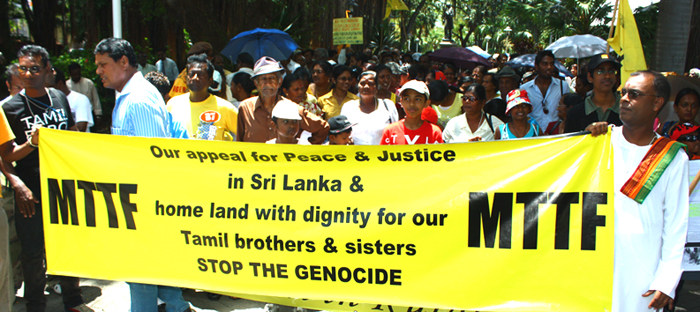
Taml social activist Thiruthondar Cheeten [right] holding
the MTTF banner.
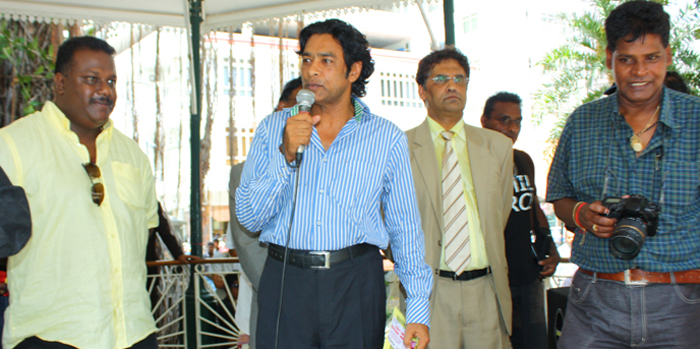
General Secretary of MSM and the former leader of the
opposition delivering his speech
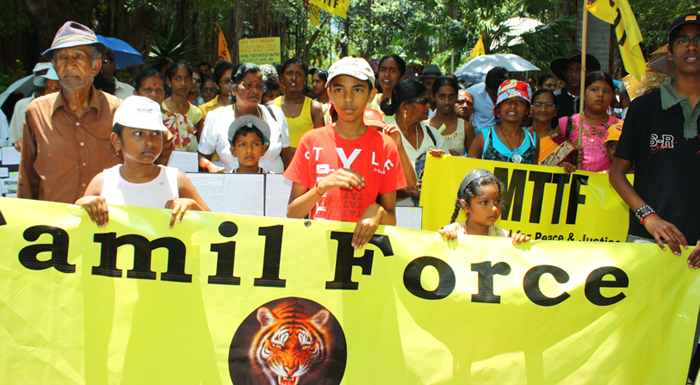
Tamil Force is an organisation of youth for justice and
fairness towards Tamils in Mauritius
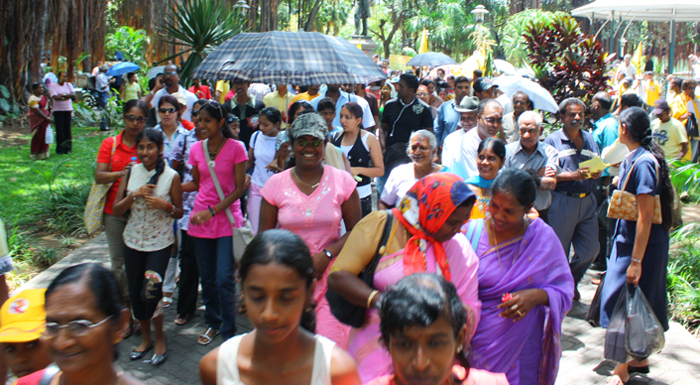
Participation of women in the protest.
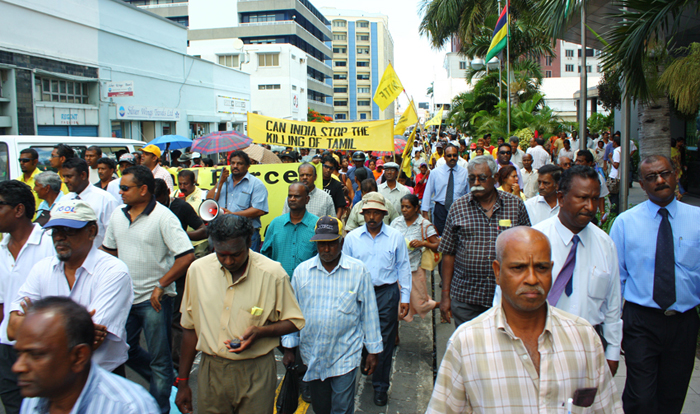 |
